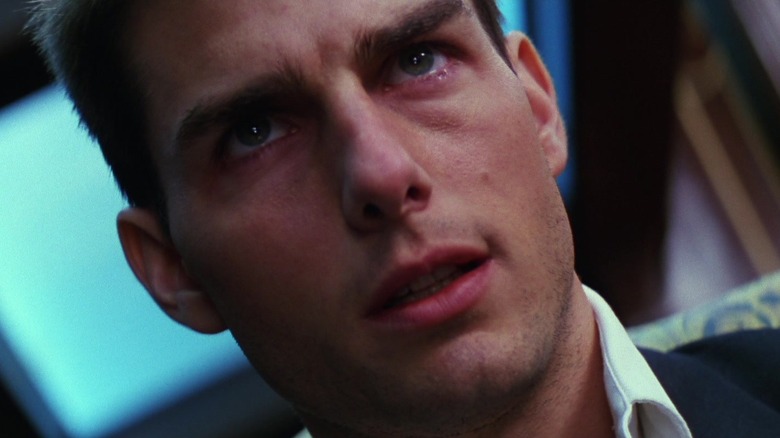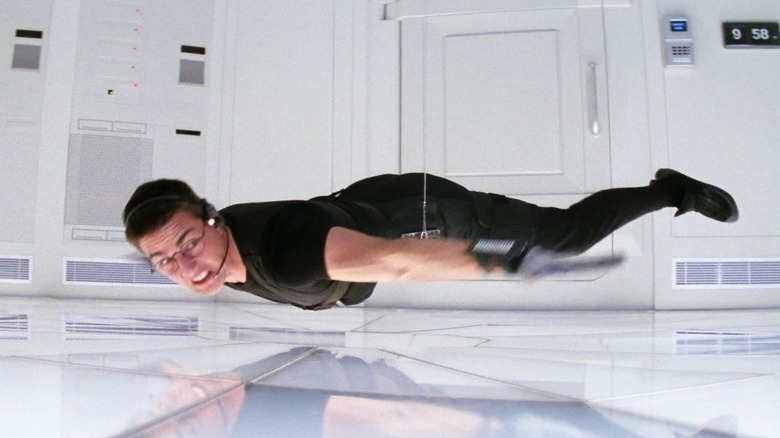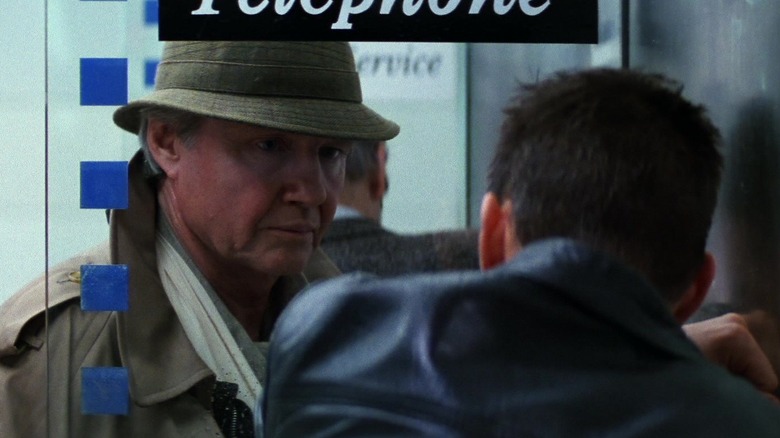Why The First Mission: Impossible Movie Is Still The Best In The Series
For television viewers of the late '60s and early '70s, "Mission: Impossible" was an accessible gateway into the thrilling world of disguises, gadgetry, and international espionage. The lauded CBS spy thriller was an invitation to get an exclusive sneak behind the curtain of operations that only the IMF had a chance of pulling off. As the spy genre became increasingly popular with the James Bond films, the canvases to tell these stories were getting bigger and bigger, and it was only a matter of time until "Mission: Impossible" made the leap to the big screen.
For nearly three decades now, Tom Cruise, the pseudo king of movie stardom, has shepherded "Mission: Impossible" from a beloved television series into one of the biggest movie franchises in the world. Every new adventure, whether heralded by a new auteur or featuring an outlandish stunt, has done a spectacular job of making each entry feel distinguishable from the previous one. At the center of these global assignments is Cruise's Ethan Hunt, an altruistic force of nature whose death-defying lust for danger has more than earned him the moniker of "the living manifestation of destiny."
With "The Final Reckoning" marking the end of an era, I've often thought about which IMF adventure stands above the rest. If you were to ask me this a few years ago, I probably would have said "Rogue Nation," with its riveting opera house sequence, jaw-dropping stunt work, and just about everything Rebecca Ferguson is doing. Christopher McQuarrie's inaugural entry is a phenomenal piece of action filmmaking that took the series to new heights, but I've swayed in recent years toward the 1996 Brian De Palma conspiracy thriller that started it all. I can tell you the exact moment it clicked into place, too.
A rattled Ethan, having lost his entire team, still musters enough energy to meet IMF director (and one of the series' greatest adversaries) Eugene Kittridge (Henry Czerny) at the designated rendezvous point for his debriefing. What starts as a routine back and forth to ascertain what went wrong becomes the ultimate entrapment as Ethan is visually submerged in his aquarium-based confinement. The two-hander conversation, primarily rooted in medium shots, becomes something much more claustrophobic and intimidating when Kittridge, a supposed lifeline, is presented in a canted low angle close up. He towers over the shaken IMF agent with the eyes of a shark, ready to chomp with his weighty accusation of Ethan being the mole they're looking for. It's at this moment where you bear witness to Ethan's transformation from helpless newbie to the defensive rogue agent he would ultimately become. The restraint in Kittridge's voice boils into a righteous anger that he hopes will make our protagonist feel trapped, but he never accounted for the ace up Ethan's sleeve, waiting just out of sight.
It's all one big game of control that De Palma executes with a technical mastery that sets the tone for one of the definitive blockbusters of the '90s.
De Palma's Mission: Impossible feels dangerous at every turn
De Palma was born out of the school that Alfred Hitchcock built, as he reformatted the master filmmaker's penchant for suspense in the age of techno-paranoia with movies like "Blow Out." You never could quite trust your senses when one or more of them may be lying to you. The other "Mission: Impossible" movies are fraught with danger and stunts that could have easily killed Cruise in a millisecond, but this entry comes the closest to being the most narratively dangerous.
Those coming in with prior knowledge of the show are greeted with an essence of familiarity, as it starts to resemble a similar team dynamic led by the esteemed Jim Phelps (Jon Voight). Prague has become the epicenter of their mission to receive the NOC list, a digital file that features the real names of all their field agents. Cruise was surrounded by heavy hitters at the time like Emilio Estevez and Kristin Scott Thomas, so you expect this team to be a constant presence throughout. But then De Palma brutally dispatches Ethan's makeshift family mere minutes apart. It creates a paranoia that lingers over the rest of the film and, in turn, provides the foundation for Ethan's determination to save the people he loves. "Dead Reckoning," in many ways, feels like an echo.
Cruise has risked his life for our entertainment, laughing in the face of Death every step of the way. It stands to chance, however, that one of his most impressive stunts is a simple one at face value, and an even greater challenge in-character. Barring the ascent along the Burj Khalifa, the infiltration of CIA headquarters provides the greatest source of tension throughout the entire series. It's the kind of insurmountable task the IMF is built for. Despite Ethan's assurance that they're going to pull it off, De Palma has primed you to learn that a victory is never guaranteed.
There can be no room for error, which only presents an even greater challenge for Ethan to stay focused. Cruise needs to become an actual ghost, but as we learn in the soundtrack-deprived heist, he's very much not that. He sweats with a visible panic on his face, knowing that any second could be his last while ensnared in the uncomfortably quiet techno spider's web. Krieger (Jean Reno) and Luther (Ving Rhames) position Ethan as a worm on a fishing pole that could be swallowed at any moment.
The unsung hero in all of this is Paul Hirsch, who edited a good chunk of De Palma's work. Rarely is there ever a moment of alleviation. You're conditioned to be as still and steadfast as Ethan is, but the arrival of external factors puts you in a similar state of pressure. I feel my heart sink every time William Dunloe (Rolf Saxon) re-entered the room, yet nothing matches the shock of Krieger's knife slamming against the desk after a job that already features so many close calls. No parody could ever diminish the white-knuckle tension of one of cinema's greatest heist sequences.
Mission: Impossible was ahead of its time when it came to subverting fan expectations
De Palma's "Mission: Impossible" has acquired a legacy of its own, with one controversial aspect dominating the conversation. Fans of the television series were livid when Phelps, once played by Peter Graves, was revealed to be the film's villain. The trustworthy team leader was now the face of the IMF's downfall. It rubbed a lot of people the wrong way in 1996. The disdain for this creative choice was so bad that it pretty much assured no one from the television series would be involved with the film in any capacity. Looking back, however, it's a brilliant subversion that not only correlates with the film's paranoia, but feels ahead of its time.
There's this hesitancy in contemporary adaptations to experiment with the legacy of the source material in fear of upsetting their fanbases. Phelps' turn was considered a betrayal of everything the character stood for, to which I say, that's what makes it so great. If you want what you enjoy about the television show, De Palma doesn't negate it. Voight's Phelps doesn't exactly conjure images of Graves' performance anyway. The twist plays into the larger picture of using familiar iconography and team tactics to lull the viewer into a state of security before kicking their chair out from under them.
Phelps' sleight-of-hand was always there, such as the moment where he utilizes the IMF mission tape's self-destruction to mask his own puff of cigarette smoke. The audience, like Ethan, could never fathom the original series' ringleader as the domino to bring it all down for nefarious reasons. A common criticism I would hear lobbied against "Mission: Impossible" was the plot being too confusing, which is hilarious in hindsight. There's a lot going on, but De Palma is such a delicate craftsman who knows how to keep track of everything, even when he's not directly telling you. It's incredibly effective when De Palma, Hirsch, and Cruise display a metatextual recollection of events that show one thing while Ethan says another. By the time we get to the train chase, we have seen the truth in Ethan's perspective and are now fully onboard his crusade to fight for what's right.
The script is a three-way effort passed back and forth between David Koepp, Robert Towne, and Steven Zaillan that comes across like a minor miracle, considering it was being written on the fly. De Palma's "Mission: Impossible" holds up as a stellar example of how adaptation doesn't necessarily mean being slavishly reverential to the source material. When you think outside the box, it opens up a world of opportunities. I haven't even mentioned the Danny Elfman score, Vanessa Redgrave as a sultry arms dealer, the opening title sequence, and De Palma's affection for split diopter shots, let alone the blockbuster thrills of that final chopper versus high speed train finale. Although I suppose that speaks to the array of happy accidents that not only imbues "Mission: Impossible" with its own identity, but lays the building blocks for how the series would evolve in subsequent installments. Red light, green light, baby.


